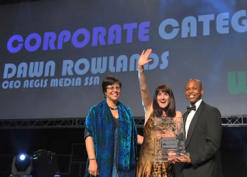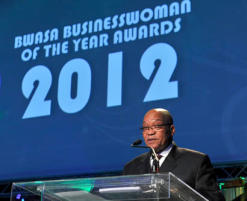
Businesswomen leaving a legacy
The five finalists for the 2013 Businesswoman of the Year awards are all trailblazers in their own right, forging careers in fields traditionally dominated by men. Established back in 1980, the awards are held under the auspices of the Businesswomen’s Association of South Africa (BWASA), an organisation that promotes and empowers women in all spheres […]


t
The five finalists for the 2013 Businesswoman of the Year awards are all trailblazers in their own right, forging careers in fields traditionally dominated by men.
Established back in 1980, the awards are held under the auspices of the Businesswomen’s Association of South Africa (BWASA), an organisation that promotes and empowers women in all spheres of business. It achieves this through various initiatives and opportunities that allow for personal growth and development, as well as offering a platform to network.
There are two categories – corporate and entrepreneurial – and according to BWASA, the programme is the only one that focuses specifically on women in business.
The five role models – two from the corporate sector and three entrepreneurs – were celebrated at an event in Johannesburg at the end of July. The two winners will be announced on 22 August – proceeds from this event will help to fund the organisation’s bursary programme.
The theme of this year’s programme is Footprints: women leaving a legacy, blazing a trail.
“The organisation is not just about recognising women, but about leaving a legacy,” said BWASA board member Mthunzi Mdwaba. “The companies that make up our membership are responsible for hundreds of jobs and billions of rands.”

(Images: The Presidency)
The finalists are Cristina Texeira (CFO at Group Five); Ntombizine Madyibi (CFO of the East London industrial development zone); Thandi Ndlovu (CEO of the Motheo Construction Group); Elma von Plaster (owner of BP Stikland); and Shauneen Proctor (partner at ad agency Idea Engineers).
“This indicates the wealth and depth of talented women in this country who contribute to building our economy and strengthening our economic and development priorities.” said BWA president Liepollo Lebohang Pheko.
Last year’s winners were Dawn Rowland, CEO of marketing services group Aegis Media, and Margaret Hirsch, COE at home electronic, appliance and retail chain Hirsch’s. They joined an illustrious group of previous honourees that includes the late Maria Maponya, financial whiz Maria Ramos, and Nicky Newton-King, CEO of Johannesburg’s stock exchange.
Anyone can succeed
The finalists poured cold water on the myth that only the smartest and the best can succeed in life.
“It was hard work that got me to where I am today,” said Texiera, who is the only female CFO among the major construction and engineering companies in South Africa. “That, and taking every opportunity that arose. I wasn’t the brightest pupil, nor did I go to the best school.”
She paid homage to her supportive parents, without whom, she said, she wouldn’t have got far. A strong support structure at home was critical, and she was also lucky to have encountered some unofficial mentors along the way.
Texeira encountered her biggest challenges later in her career, rather than at the start of it. Even in today’s world the boardroom can be male-dominated, and entering into this environment was daunting at first, she said.
“The organisation took a chance on me – I was young and inexperienced in terms of the requirement – but I was in the right time at the right place.”
She found that often, her male colleagues simply forgot that she was there – “For instance, sometimes an email is addressed to ‘gents’.”
She and Madyibi agreed that women can be sometimes overlooked in a predominantly male environment. And their needs are not always addressed – for instance, a lack of toilets for women on-site. These are all issues that need to be looked at as women venture further into unfamiliar territory.
It’s not true that the Eastern Cape has little in the way of success stories, said Madyibi. She came from a poor background and got herself out of that situation, she explained. “I was the first chairperson of the Black Management Forum in the Border region, and the first CFO of the East London industrial development zone (IDZ). That meant that I had to develop the strategy for finance, and design policies.”
She had to work hard, she said, being the only woman in a boardroom with six men. “I had to convince them that I was there on merit.”
Looking forward, Texiera said she wasn’t done yet. “I’m only halfway through my journey – I still aim to support the 18% of women in our organisation, and ensure we develop internal staff as well as the community.”
Madyibi agreed, saying that the best way to give back would be to take people, especially young women, along with her. “There are 6 000 people who have jobs because of what we are doing, but I also am very active in the community because I hold myself as a role model for our girls.”
Women must team up
Asked for the secret of her success, Ndlovu, whose Motheo is one of the largest BEE construction companies in South Africa, said that she decided to recruit young, mainly black female, people and older, mainly white male, people.
“This was an effective blend of skills and expertise, and youth and energy. Today that has proven to be a successful model, although the company is 54% black women-owned.
She has her doubts about the effectiveness of BEE in today’s world. “I think BEE is beginning to defeat itself. Today, you’ll often find that the BEE people have no direct role in building the business, even if it has a high BEE score. This is counter-productive.”
Von Plaster, who took over the BP Stikland service station in 2007 and saved it and 15 jobs from a sad end, said that in her industry the oil companies are pro-women. “They don’t discriminate in the working environment. Our challenge, rather, is access to finance – especially black women.”
She said that her turnaround strategy came about when a woman at the bank believed in her and gave her a loan. “We women must team up.”
Honouring South Africa’s women
The BWA in its current form is a result of the merging in 2000 of the Executive Women’s Club, the National Association of Women Business Owners and the Professional Women’s Leadership Development Organisation.
The head office is in Johannesburg and there are branches around the country, located in Soweto, Durban, Empangeni, Bloemfontein, Cape Town, East London, Port Elizabeth, and Queenstown.
Now in its 34th year, BWASA’s Businesswoman of the Year award is considered the premier event of its kind in South Africa. Its main objectives are:
- To create a mechanism for celebrating women’s contributions to the economy;
- To recognise the success of women leaders in business, and create a network of female role models whose achievements will inspire other women to aim high;
- To raise funds for BWA bursaries offered to women pursuing business studies.
Since 1988, all revenue from the award programme has gone to the BWA’s bursary programme. Funds raised through the gala dinner on August 22 will also go into the fund, which has distributed more than R500 000 to women postgraduate students in recent years. Individuals or organisations wanting to contribute bursary fund can make a donation.
Candidates for the title are nominated by third parties, and must give their consent for the judging process, which includes an audit of financial statements. Nominees must be South African citizens or residents, and must have been with their present companies for no less than three years. They must control an annual budget of at least R75-million (corporate) and R35-million (entrepreneurial). In addition, nominees in the latter section must own at least 35% of the business.
Judging panels, says the BWA, are selected to ensure no potential business competitor has access to sensitive information.
The BWA is also active in promoting gender equality in the business world, and is at the forefront of an economic gender advocacy programme, which will contribute towards developing the content of the new Women Empowerment and Gender Equit
y Bill, as well as a charter for the empowerment of women.
By: Janine Erasmus
Source: www.mediaclubsouthafrica.com
